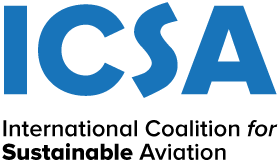In October 2016, the 191 Member States of the Assembly of the UN International Civil Aviation Organization (ICAO) adopted a resolution establishing the Carbon Offsetting and Reduction Scheme for International Aviation (CORSIA). CORSIA aims to stabilize the international aviation sector’s net carbon dioxide emissions at 2020 and will be in effect from 2021-2035. In December 2017, the ICAO Secretary General distributed to all ICAO Member States the draft Standards and Recommended Practices (SARPs), also known as the CORSIA Package, to implement CORSIA. ICAO Member States can send their comments on the CORSIA Package to the ICAO Secretary General by March 5, 2018. To aid States in these responses, the International Coalition for Sustainable Aviation (ICSA) developed “Understanding the CORSIA Package: A critical guide to key provisions in the draft Standards and Recommended Practices and related guidance material for the UN International Civil Aviation Organization’s Carbon Offsetting and Reduction Scheme for International Aviation (CORSIA)”.
While the majority of the CORSIA Package is technically sound and should be maintained, ICSA identifies several areas of the CORSIA Package that must be strengthened before the Package is agreed in order for CORSIA to function properly and achieve its environmental purpose.
ICSA’s top-line recommendations on the CORSIA Package are:
- CORSIA reporting as proposed in the CORSIA Package is not sufficiently transparent. Allowing third parties to access aeroplane operator emissions reports would help ensure the environmental integrity of CORSIA and avoid market distortion by deterring special treatment of carriers. However, if States choose to keep the CORSIA Package text as it is, the burden is on them to actively verify other States’ emissions reports with the tools and approaches currently laid out in the SARPs.
- The CORSIA Package must continue to make clear that only CORSIA Eligible Emissions Units can be used for compliance with CORSIA. A State must not be able to apply these criteria or some other criteria unilaterally.
- ICAO should refrain from crediting aviation alternative fuels under CORSIA until the sustainable aviation fuels provisions in the CORSIA Package, particularly the sustainability criteria, are strengthened. The sustainability criteria – the criteria against which aviation alternative fuels are evaluated to be eligible for credit under CORSIA – must be strengthened to encompass not only emissions reductions of the fuels, but also their social, economic, and other environmental sustainability attributes. Comprehensive, robust sustainability criteria should be included in the final CORSIA Implementation Elements before the CORSIA pilot phase begins on January 1, 2021.
- States should publicly disclose their responses to the CORSIA Package State Letter. If a critical mass of States discloses this information, it will encourage greater public confidence in this ICAO State Letter process, including any text changes made by ICAO or the ICAO Council.
Summary:
“Civil Society Recommendations on the ICAO CORSIA Package” (EN)
“Recommandations de la société civile sur le régime CORSIA de l’OACI” (FR)
